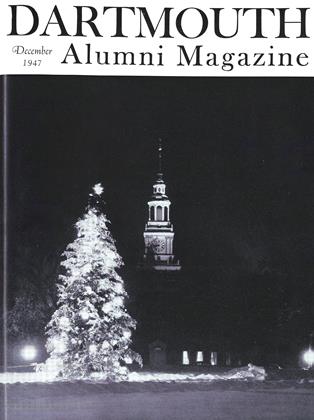OWING TO LACK of space last month my column, dictated from Dick's House, was deleted. Salvaging part of it I add the names of a few books, some of which I shall mention later, which I think would make excellent Christmas gifts.
These are Edwin Way Teale's edition of Thoreau's Walden, A. B. Guthrie's TheBig Sky, Bernard de Voto's Across theWide Missouri, Robert Frost's Masque ofMercy (limited edition preferred), Elton Trueblood's edition of Dr. Johnson's Prayers, Harold McCracken's book on Frederick Remington, Van Wyck Brooks' TheTimes of Melville and Whitman, John Jay's Skiing the Americas, Vincent McHugh's The Victory, the limited edition (preferred) of Ben Ames Williams' HouseDivided, Louis J. Halle's Spring in Washington, The Notebooks of Henry James, edited by Matthiessen and Murdock, and Arnold J. Toynbee's A Study of History.
The Steeper Cliff by Davidson is a story of a man finding himself in Occupied Germany, finding himself, that is, in a psychic way. Although not wholly satisfactory, none the less this novel is well worth reading. It was first recommended to me by an Australian war correspondent in New York, and I agree with his high estimation of it.
Hans Gisevius' To the Bitter End is a book which needs careful reading, and which tells of the Underground movement in Germany against Hitler. The Underground, needless to say, got little help from England or America. Had they received any, it is quite possible the whole course of the war might have been different. Along with this book I also read William Shirer's End of a Berlin Diary, which tells of Shirer's revisit to Germany after the war, and which contains quite a few documents of real importance in understanding postwar history. I like this book particularly because of Shirer's point of view. He doesn't believe in the policy of rebuilding a strong Germany. He fears them and believes that their only regret is that they lost the war, that they have no sense of guilt or responsibility for the Nazi atrocities. Well worth reading.
A totally different kind of book which I have found entertaining was James Ramsey Ullman's Kingdom of Adventure ....Everest, published by William Sloane Associates. Mr. Ullman has taken the narratives from the past Everest books and woven them together into a chronological tale of the many attempts to conquer Everest, which, until proved otherwise, is the highest mountain in the world. Those who are familiar with Everest literature will not get much that is new, but it is always worthwhile to re-read in particular the story of Mallory and Irvine who died near the top in 1924. One of the best features of this book is the maps which really make clear the routes to the top.
A rather interesting historical novel to me, because I had recently been visiting Dick Mandel '26 who lives in the terrain covered by this book, was Edward Stanley's novel called Thomas Forty, published by Duell, Sloan and Pearce. This novel tells of the American Revolution around White Plains and Westchester, New York, and features Andre, Arnold and, of course, Washington.
In R. E. Gould's Yankee Drummer there is an interesting reference for Dartmouth men on page 221 which reads as follows: "In White River Junction one might be driven to do anything." This is an amusing, folksy kind of story of the man who wrote a popular book Yankee Storekeeper a year or two ago.
The drawings by Lee Jacques in Canadian Spring, published by Harpers, are much better I must say than the prose written by his wife Frances. I cannot remember ever reading a woman nature ivriter who is really first class. This book covers a two months' trip from Winnipeg West and North.
 View Full Issue
View Full Issue
More From This Issue
-
 Article
ArticleMEN VS. MICROSCOPES
December 1947 By JOHN HURD '21 -
 Article
ArticleHANOVER'S NOTED CLINIC
December 1947 By ALICE POLLARD -
 Class Notes
Class Notes1918
December 1947 By ERNEST H. EARLEY, DONALD L. BARR -
 Class Notes
Class Notes1917
December 1947 By KARL W. KOENIGER, DONALD BROOKS -
 Class Notes
Class Notes1919
December 1947 By J. K. HUNTINGTON, MAX A. NORTON -
 Class Notes
Class Notes1934
December 1947 By FRANKLYN J. JACKSON
HERBERT F. WEST '22
-
 Article
ArticleHanover Browsing
February 1947 By HERBERT F. WEST '22 -
 Books
BooksTHE EDUCATION OF YOUTH AS CITIZENS
July 1947 By Herbert F. West '22 -
 Article
ArticleHanover Browsing
January 1952 By HERBERT F. WEST '22 -
 Article
ArticleHanover Browsing
March 1953 By HERBERT F. WEST '22 -
 Article
ArticleHanover Browsing
April 1953 By HERBERT F. WEST '22 -
 Books
BooksTHE SIX LOVES OF "SHAKE-SPEARE."
OCTOBER 1958 By HERBERT F. WEST '22








